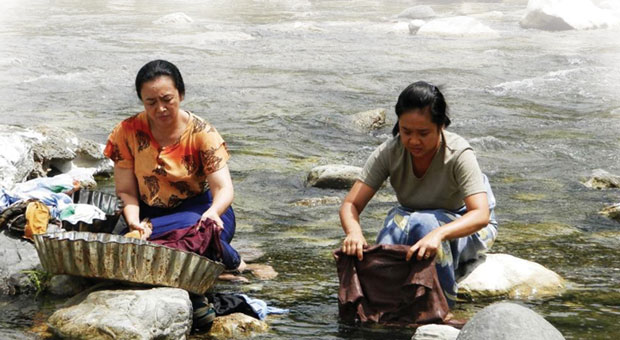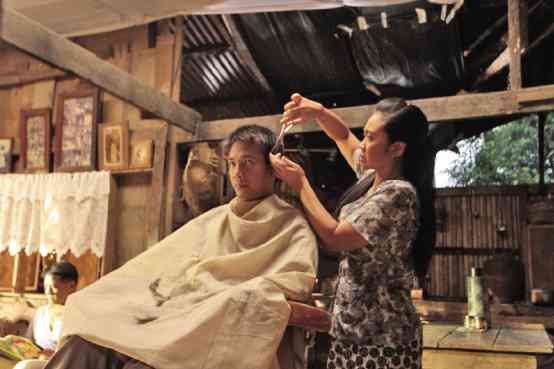The true, the bad, the ugly

SHAMAINE Centenera-Buencamino (left) and Eugene Domingo’s characters show that empowerment is sisterhood, not selfishness.
Written and directed by Jun Robles Lana, “Barber’s Tales” is a fresh break from today’s plethora of formula movies that show women clawing at each other over a man.
Not since Marilou Diaz-Abaya’s “Moral” and Chito Roño’s “Bata, Bata, Paano Ka Ginawa” has a film so thoroughly and intelligently tackled the plight of women. The themes of empowerment of women and the accompanying sisterhood unfold naturally and engagingly, just as the story itself unfolds without sermonizing, a method that usually mars a film about politics.
The setting is around 1975 in a small town in the province. There is apparent peace, but people know how often this is ruffled by encounters between government troops and the underground rebel army.
Marilou (Eugene Domingo) is suddenly widowed when her husband Jose (Daniel Fernando) dies of bangungot. Knowing no other way to make a living, she reluctantly takes over her husband’s trade as a barber, and soon finds herself in demand.
From the corrupt pro-Marcos Mayor Alberto Bartolome (Nonie Buencamino) to the poor townsfolk—everyone becomes Marilou’s customer. The townsfolk gather at the barbershop, as in olden days, to gossip and pass judgment on others.
Article continues after this advertisementArticle continues after this advertisement
Female bonds
One day, Marilou’s godson Edmund (Nicco Manalo), nephew of her close friend Tess (Shamaine Centenera-Buencamino), seeks help for a rebel friend being pursued by government forces. Soon, Marilou, Tess and another friend, Susan (Gladys Reyes), and the other women in the small town are all helping the rebels with moral and material support.
Meanwhile, the mayor’s battered wife, Cecilia (Iza Calzado), finds solace in Marilou’s friendship. Rosa (Sue Prado), a prostitute whom Jose used to visit regularly as a customer, likewise strikes a friendship with Marilou.
Nowhere is sisterhood shown more clearly than in these friendships, where the personal is political. Empowerment of women is embodied in the close ties that the female characters develop. They are depicted as very sensitive to gender problems as well as to economic and sociopolitical issues. Thus, their choices are defined, not by being pushed into political situations without awareness of the dangers, but precisely by living through the conditions and identifying the best paths to take.
No selfishness
For these women, empowerment means seizing control of their lives and steering their own destinies, and helping improve the lives of others. Here, empowerment is sisterhood, not selfishness.
Another salient quality of “Barber’s Tales” is the apt use of comic relief amidst danger. It does not resort to gore for sensationalism or shock effect. Even without the requisite torture scenes, the point about the evils of martial law is efficiently driven home and the audience understands. The true, the bad, and the ugly in those dark days of our history are not dodged; they are drawn sharply.
The whole cast—including Eddie Garcia (as priest Arturo) and bit players Lui Quiambao Manansala and Nora Aunor—gives a sterling performance. The cinematography by Carlo Mendoza, production design by Chito Sumera, music by Ryan Cayabyab, and editing by Lawrence Ang blend well.
Crystal-clear
“Barber’s Tales” may well be one of the best films of the past 100 years. The difficult themes are brought to light in a way that is entertaining and serious in equal parts. Gender issues are crystal-clear, meshed with ease into the sociopolitical fabric of martial law.
We all know that the specter of the past has vestiges in the present, especially where women are concerned. As a film “Barber’s Tales” is hard to top.
